We all strive to be healthier versions of ourselves and improve our overall wellbeing. Most of the time, we tend to concentrate only on the body, focusing on our physical health, such as exercising daily and eating a well balanced diet. While this is extremely important, it’s not the only component of total wellbeing we should be improving. Your “mind” is equally just as important and we need to nurture our mental health.
What is the Mind-Body Connection?
The mind-body connection is the link between a person’s thoughts, attitudes, and behaviours and their physical health. The mind and the body are not two separate entities—although they are often treated that way. Your physical health and emotional health are intertwined in what’s known as the mind-body connection.
How you think can affect how you feel. And how you feel can affect your thinking. Hence, that’s why we often hear the saying that “your thoughts become your reality.”
One of the simplest way to put this is have you ever felt your stomach tighten up when you were anxious? Or have you experienced high levels of stress at work which caused you to have trouble sleeping? Well you’ve experienced the mind-body connection.
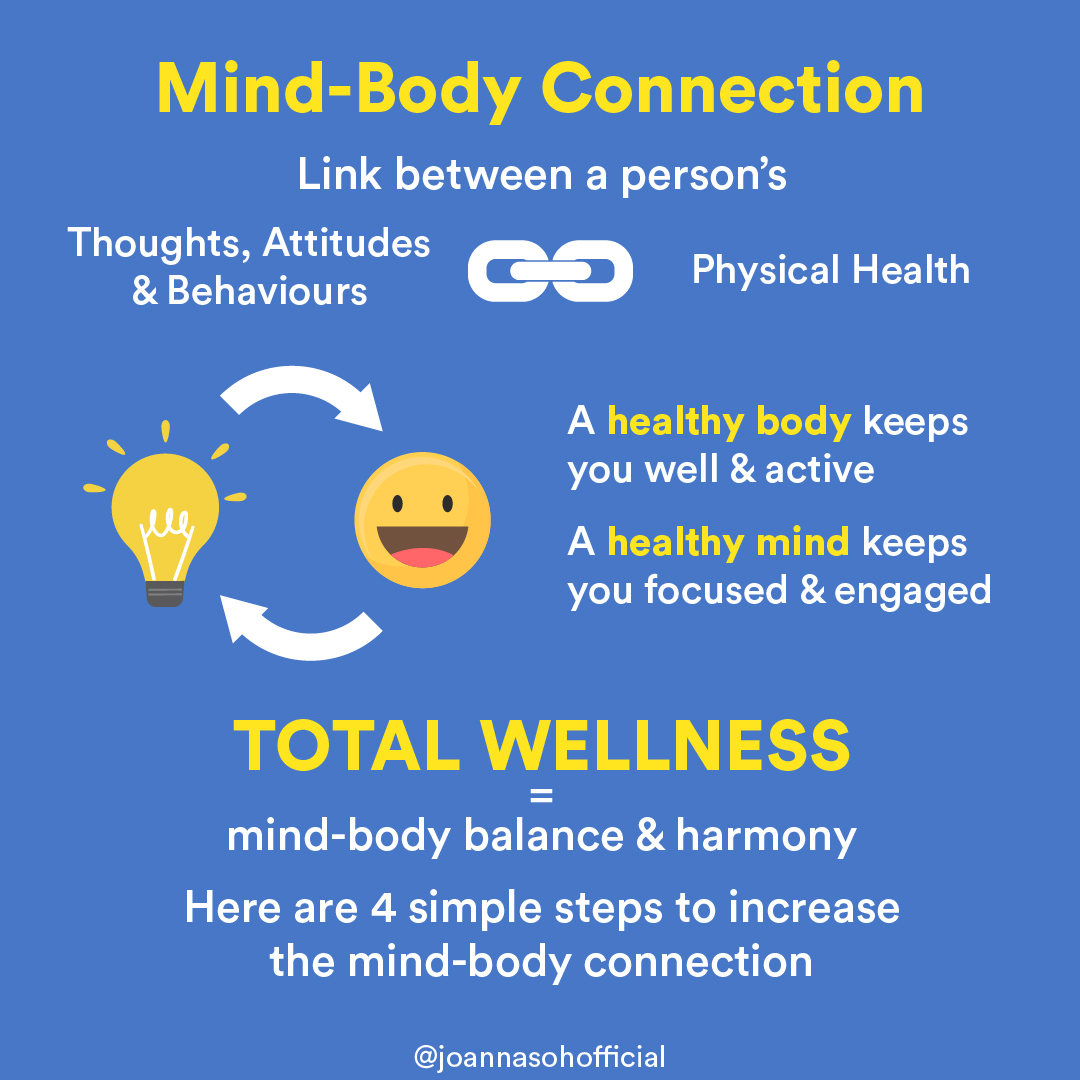
It is important to note that the “mind” does not mean the brain. The “mind” consists of mental states such as the thoughts, beliefs, attitudes and emotions. Whereas think of the brain as the “hardware” that allows us to experience these mental states.
Our mental states can be fully conscious or subconscious. We can have emotional reactions to situations without being aware of why we are reacting a certain way. And each mental state has a physiology associated with it, whether it’s a positive or negative respond felt in the physical body.
For instance constant worry and stress over jobs, finances or family issues can cause your body to reacts as if it is “under attack”. Your body releases hormones that speed up your heart rate and breathing, increase blood pressure, and make your muscles tense. This physical reaction is called the fight-or-flight stress response. If you constantly feel stressed, your body's natural fight-or-flight response lasts too long which can lead to high blood pressure as well as other mental issues such as depression or anxiety.
On the other hand, what we do with our physical body, such as what we eat, and how much we exercise can also impact our mental state.
If you lead a sedentary life and eat crappy food, you will constantly lack in energy, struggle to focus and feel moody. However, if you eat a well balanced diet and exercise on a regular basis, your body will produce endorphins, making you feel good and boost your energy level as well as positive attitude.
A healthy body keeps you well and active. A healthy mind keeps you focused and engaged. Hence to achieve total wellness, it’s not one of the other, but it’s about bring balance and harmony to the mind and body.
Becoming Aware of the Connection
Do you sometimes feel lifeless, or bored? Do you dread each coming day and feel like you’re merely existing instead of really living? You feel like you’re not making progress and time flies really quickly. Stop living life on “autopilot” making unconscious, automatic decisions that don’t align with how you want to work and live.
The single more important step is to become more aware of our mental states. Basically to increase the consciousness in our thoughts, attitudes, beliefs and physical actions or reactions. Once you are aware of what you want, you can align your thoughts and actions. Here are 4 simple steps to increase the mind-body connection:
1. Positive Visualisation
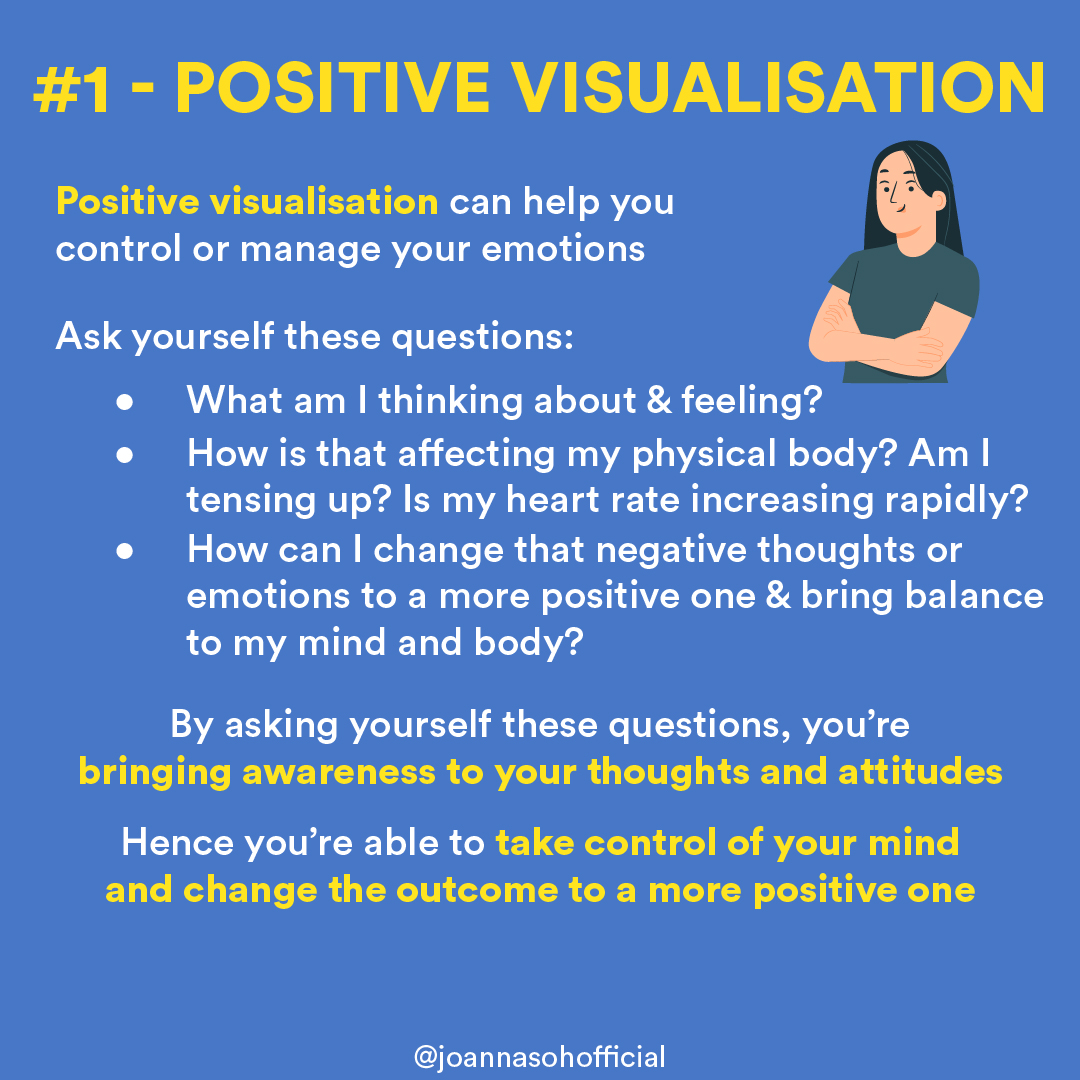
Have you seen the movie “Inside Out”? The film is brilliant in depicting our emotions visually. Sometimes, it’s so hard for us to express or visualise how we think and feel. A fun way is to look at our emotions as those characters portrayed in the movie. When we imagine a situation, the primal parts of the brain react as if it was really happening. Therefore, positive visualisation can help you control or manage your emotions.
Ask yourself these questions:
- What am I thinking about and feeling? Think of the characters
- How is that affecting my physical body? Am I tensing up? Is my heart rate increasing rapidly?
- How can I change that negative thoughts or emotions to a more positive one and bring balance to my mind and body?
By asking yourself these questions, you’re bringing awareness to your thoughts and attitudes, hence you’re able to take control of of your mind and change the outcome to a more positive one.
2. Positive Self Talk
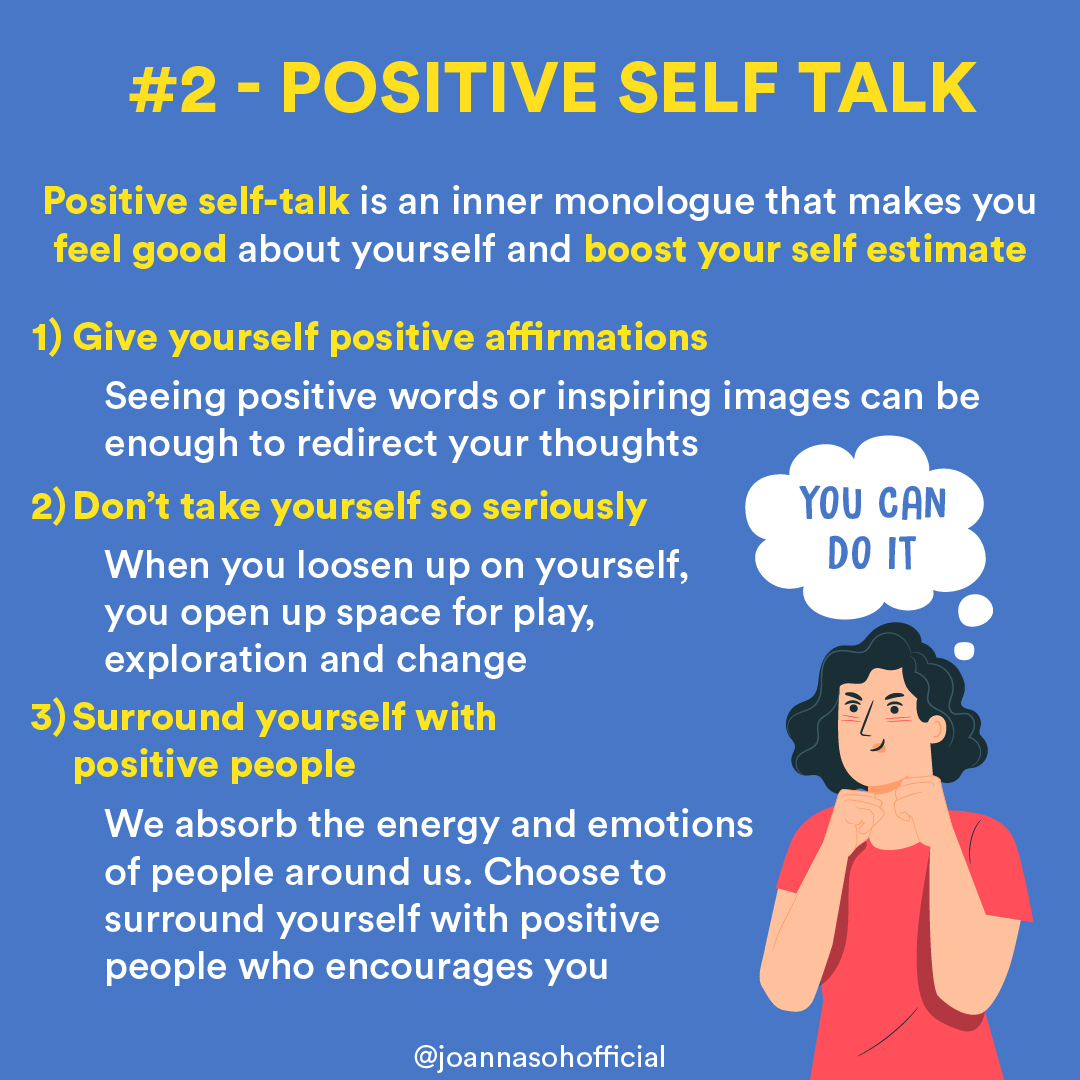
Sometimes, we catch us talking to ourselves. Self-talk is your internal dialogue. It is influenced by your subconscious mind and it reveals your thoughts, beliefs and ideas. Self-talk can be both negative and positive.
Positive self-talk is an inner monologue that makes you feel good about yourself and boost your self estimate. It's an optimistic voice in your head that encourages you to look at the bright side, pick yourself up when you fall and can enhance your performance.
The world’s greatest athletes might not always be the strongest physically or the most skilful, however they are mentally strong and they often have a positive inner monologue with themselves. What they tell themselves right before the competition can determine the outcome.
If you believe your self-talk is often too negative, let’s learn to shift that inner dialogue. Here are some example:
Negative: I’m overweight and so out of shape. I might as well not bother and stop trying.
Positive: I am capable and strong, and I want to get healthier for me.
Negative: I’ve never done this before and I’ll pretty sure I’m gonna fail at it.
Positive: This is a wonderful opportunity for me to learn from others and grow.
Forming new habits take time and effort. But if you start to become aware of your own inner monologue, positive self-talk can become your norm. Here are some tips I’ve been practicing to build up a more positive self-talk:
- Give yourself positive affirmations - Seeing positive words or inspiring images can be enough to redirect your thoughts. This can be as simple as having positive affirmations in your home or office, on your phone and anywhere you spend a significant amount of time.
- Don’t take yourself so seriously - So what if you mess up? When we take ourselves too seriously, we believe everything revolves around us. That's why we fear being ridiculed and this stops us from trying. When you loosen up on yourself, you open up space for play, for exploration, and for change.
- Surround yourself with positive people - Whether or not you notice it, we absorb the energy and emotions of people around us. This includes both negative and positive, so choose to surround yourself with positive people who encourages you.
3. Eat Well, Move More
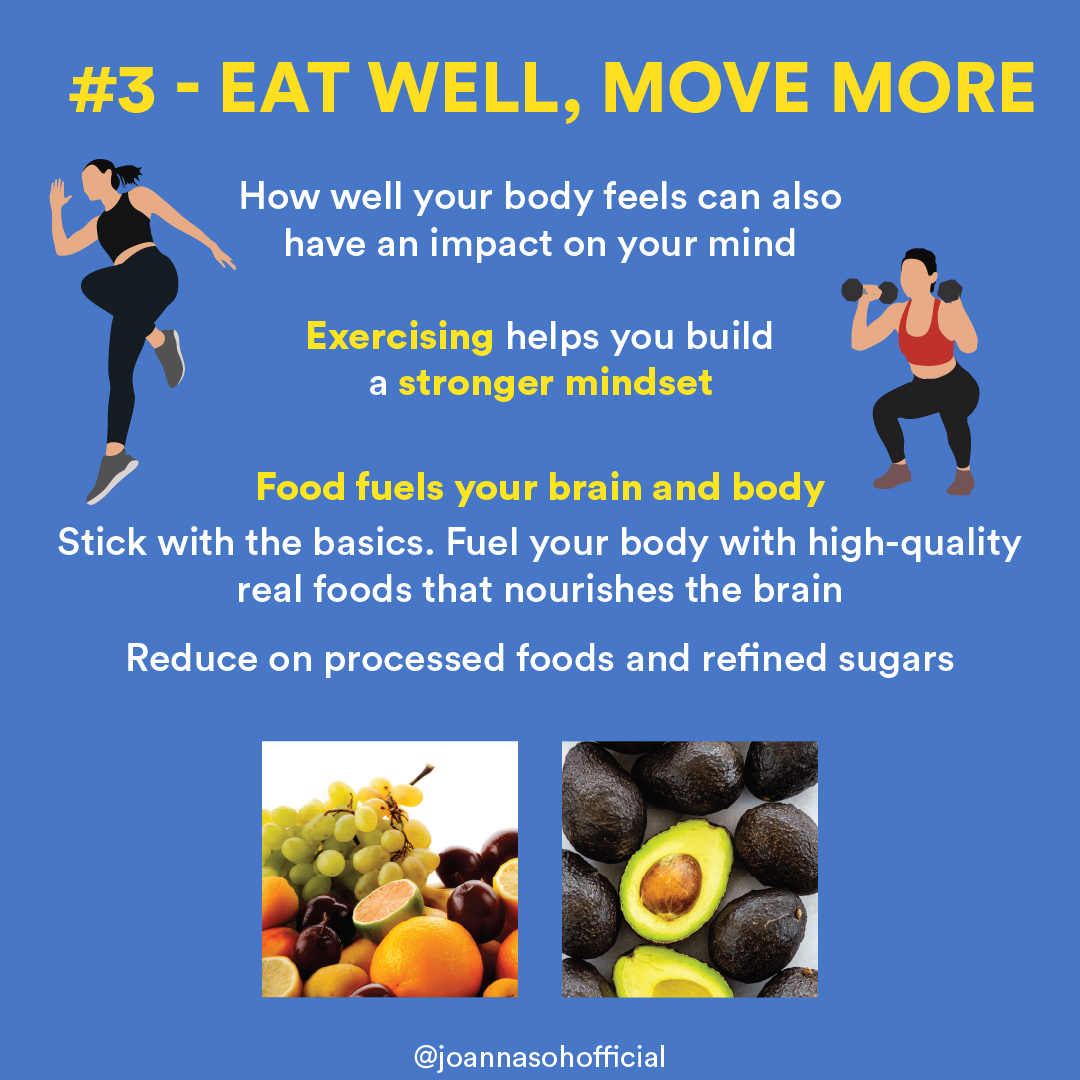
We all know that we should be looking after our bodies, eat well and move more. That’s because how well your body feels can also have an impact on your mind. I exercise regularly and eat a well balanced diet because I love how it makes me feel. I’m energetic through the day, I’m able to sleep better, I feel more relaxed and have a more positive outlook in my life.
For me, I love to lift weights and perform HIIT exercises. When I work out, I’m in the zone where I’m really in-tuned with my own body and what I want to accomplish. And this helps me to build a stronger mindset too. So don’t just exercise mindlessly. Be in the moment, be in tuned with your own body and this can help you to push further especially when you feel like giving up. There are many forms of exercise that you can also incorporate which focuses on the mind and body connection such as yoga, tai chi, Qigoing and pilates.
When it comes to food, we often hear this saying, “you are what you eat”. There’s a lot of truth in that. Food is fuel. Food fuels your brain and body. And the “fuel” that you choose will directly affect the structure and function of your body and body.
This doesn’t have to be complicated. Stick with the basics. Fuel your body with high-quality real foods that nourishes the brain. Reduce on processed foods and refined sugars, because overtime, consuming too much junks can cause inflammation in the body, worsen mood disorders and other mental and body illnesses.
4. Stay Connected
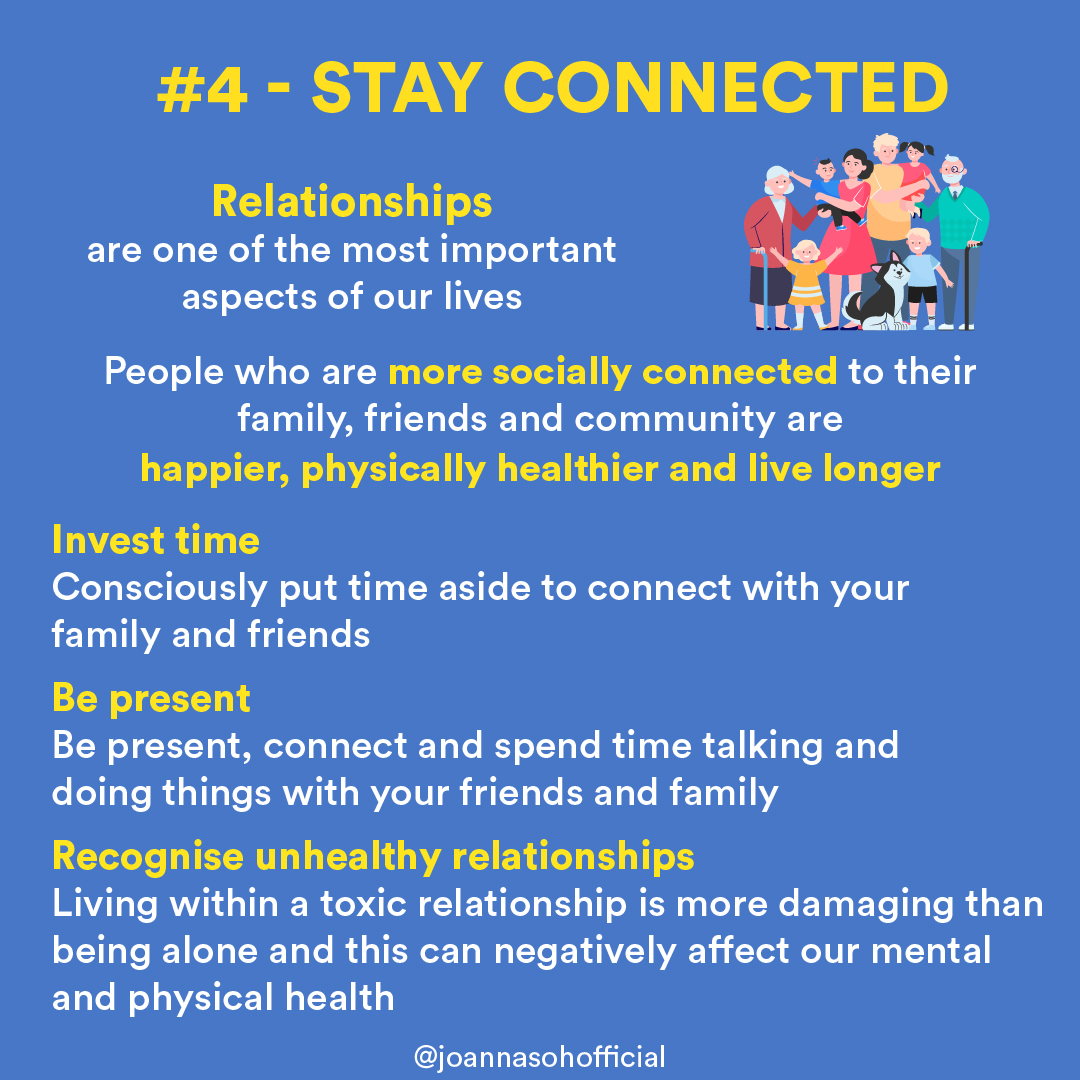
Relationships are one of the most important aspects of our lives, yet we often forget just how crucial our connections with other people are for our physical and mental wellbeing.
People who are more socially connected to their family, friends and community are happier, physically healthier and live longer, with fewer mental health problems, compared to those who are isolated or less connected. Having close, positive relationships can give us a purpose and sense of belonging. It’s not just the number of friends you have, but it’s the quality of your relationships that matters.
How we interact and form relationships has changed so much over the past decade. Nowadays we’re so hooked up on social media and the online world that we’ve often forgotten what it feels like to have a meaningful relationship with someone. You might have lots of friends online, but if you are in need for emotional support, do you have someone that you can call and turn to?
Here are 3 things you can do to start building position relationships:
- Invest time - Yup, you need to conscious put time aside to connect with your family and friends. That means, don’t work long hours or the weekends all the time.
- Be present - Yes, you’re physically with your family and friends. However, do you catch yourself engaging on your phone instead of engaging with them? What is the point that? You don’t always have to be online, because those friends online aren’t “real relationships”. Be present, connect and spend time talking and doing things with your friends and family.
- Recognise unhealthy relationships - Living in conflict or within a toxic relationship is more damaging than being alone and this can negatively affect our mental and physical health. Recognising this can help us to get out of it, move forward and find solutions to issues.
In Essence
While we still have a lot to learn about the mind-body connection, there’s no doubt that taking care of our mental health is just as important as our physical health. The mind-body connection isn’t just about how the mind affects the body—it’s also about how the body affects the mind. Hence, making healthy lifestyle choices is an important part of maintaining the balance between mind and body.
_



